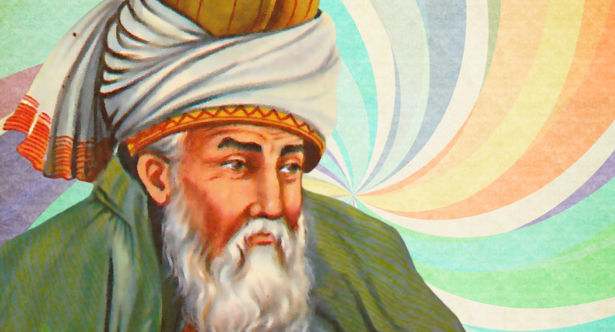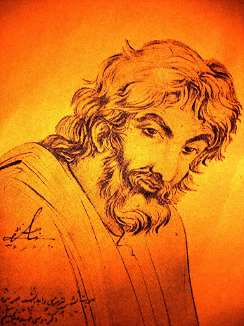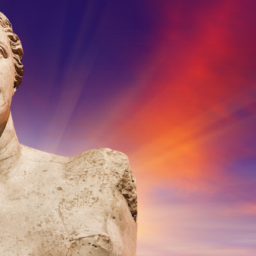
You’ve probably heard of the renowned ancient spiritualist, Rumi, but who was he? Maulana Jalaluddin (“Glory of Religion”) Rumi, most commonly known as ‘Rumi’, was a Persian poet, an Islamic dervish, and a Sufi mystic. He articulated his spiritual journey through poignant verses and expressive poems that are now quoted across the globe.
Rumi’s poems have been translated into many languages and transposed into various formats. His poetry creates the basis for an abundance of classical Iranian and Afghan music.1 Additionally, Rumi’s works have influenced the literary traditions of the Persian, Ottoman Turkish, Chagatai, Urdu, Bengali, and Pashto languages.2 While his pieces are world-famous, many aren’t familiar with Rumi’s life, the relationships that inspired his work, nor his path to enlightenment.
Rumi’s Early Life
Rumi was born on September 30th, 1207 to a wealthy, prominent family.3 His birthplace is reported to be in Balk, which is in present-day Afghanistan. Bahaduddin Walad, Rumi’s father, was a sultan, theologian, jurist, and mystic. When the Mongols invaded Central Asia between 1215 and 1220, Rumi’s family and a group of disciples ventured westward for safety.
Some say that during this journey, Rumi met one of the most famous mystic poets, Attar, in the city of Nishapur. He recognized Rumi’s spiritual eminence and gave him his Asrarnama, a book about the entanglement of the soul in the material world.4 This account is not widely agreed on by Rumi scholars.
Rumi’s family was called to Konya in 1229. Here, Rumi’s father taught at one of the madrasahs, or religious schools, until he died in 1231. His position at the madrasah was inherited by Rumi, who was 25 at the time.
During Rumi’s time at the school, one of his father’s disciples, Burhanuddin Tirmadhi, trained him in Shariah and Tariqa. Shariah is the religious concepts of Islam, or essentially, the law. Tariqa is the Muslim spiritual path towards direct knowledge (ma’rifah) of God or Reality (haqq). In the 9th and 10th centuries, though, it referred to the spiritual path of Sufis, or mystics.
In 1232, Rumi returned to Konya and is said to have taken 3 successful Chella (40 days of fasting, retreat, and meditation) after Burhanuddin told him he needed to master “the hidden sciences.”5 Soon after, Rumi began to serve as a reputed religious scholar in Konya.
In Rumi’s 30s, he would meet Shams Tabrizi; an encounter that would completely change his life and transform him into an ascetic. Their connection is often misunderstood and misquoted, but it is one of the most important chapters in Rumi’s life.
Shams Tabrizi and Enlightenment
In 1244, Rumi came across a wandering dervish named Shams Tabrizi. Shams was known to be an antisocial and blunt yet powerful spiritual wanderer.6 His nickname was ‘The Bird’ due to his nomadic lifestyle and the idea that he could transport his essence or fly to any place at will.7
Shams was looking for a student who would absorb and spread his profound spiritual-philosophical knowledge, so he took Rumi under his wing. The two spent a total of 40 days secluded in Konya.8 During this time, Shams encouraged Rumi to reorient from a path of knowledge to one of love and truth. Rumi vowed to abide by The 40 Rules of Love and thus became enlightened.9
Excerpts of The 40 Rules of Love:
- “How we see God is a direct reflection of ourselves.”
- “The path to the Truth is a labor of the heart, not of the head.”
- “You can study God through everything and everyone in the universe, because God is not confined in a mosque, synagogue, or church.”
- “Intellect and love are made of different materials.”
- “Most of the problems in the world stem from linguistic mistakes and simple misunderstandings.”
You can read The 40 Rules of Love here.
Shams’ Disappearance
Shams’ lower social class status caused tension among Rumi’s prominent followers. One day, Shams mysteriously disappeared. Some believe that he was killed by either Rumi’s students or Rumi’s son in a fit of jealousy.10
Shams’ disappearance caused Rumi to dive into a deep state of grief. He coped with the pain of separation through dance, music, and poetry. The poems he wrote during this grieving phase is known as Divan-i Shams-i Tabrizi (The Words of Shams of Tabriz). Rumi then set out to look for his friend, Shams, but he soon realized:
“Why should I seek? I am the same as
He. His essence speaks through me.
I have been looking for myself!”11
With this realization, Rumi moved on with his life and eventually found other companions, such as Salahuddin Zarkub and Husamuddin Chelebi. It was Husamuddin, though, whom Rumi recited the Masnavi to during the last seven years of his life. There are 6 books in the Masnavi, each consisting of 4,000 verses. The 6th book remains unfinished.
Pictured: Shams Tabrizi Source: Feeling Buddaful
Rumi’s Following
For 800 years, Rumi’s words have inspired, consoled, and comforted people of all ages, origins, and walks of life. In recent popular culture, Coldplay’s Chris Martin read poems written by Rumi throughout his divorce to Gwyneth Paltrow to lift his spirits, and he even wrote a Coldplay track that features Coleman Barks, a Persian Poet, reciting one of Rumi’s poems. Rumi is also reported to have aided the spiritual journeys of other celebrities such as Madonna and Tilda Swinton.
Love for Rumi
A research study administered by the Rumi Network sought out explanations as to why Rumi is still so popular today. The study asked 50 participants to briefly explain why Rumi meant so much to them. Responses include:
- He is not only intellectual but heartfelt. He caters to their hearts, instincts, and emotions rather than purely on their intellects.
- His poetry has many levels. The more they learn about Rumi and his life, the more they appreciated his depth.
- They find the sense of unity in his poems to be alluring.
- After reading his poems, they feel as though he is a friend.
- They associate themselves with him and reading his poetry is a personal process.
- Every time a Rumi poem is recited, they feel as if Grace is descending.
- He is akin to a lover.
- His expressiveness enables participation in Rumi’s own internal process.
- He is like a spiritual guide.
- His poetry forms a cultural bridge.
- Even those that don’t like poetry love reading Rumi.
Rumi composed over 70,000 verses of poetry focusing on varied and diverse topics. Many of his pieces cover expressions of love and desire, while others dive into philosophical subjects. His work has a universality that appeals to everyone, which is why Rumi’s influence continues to reach and inspire people from one end of the globe to the other.
Rumi Quotes to Brighten Your Day
If you’re seeking enlightened words, here are some Rumi quotes that may help bring light, love, and inspiration while also expanding the mind. Enjoy!
“Lovers don’t finally meet somewhere. They’re in each other all along.”
“Goodbyes are for those who love with their eyes. Because for those who love with heart and soul, there is no such thing as separation.”
“Stop acting so small. You are the universe in ecstatic motion.”
“The cure for pain is in the pain.”
“When you do things from your soul, you feel a river moving in you, a joy.”
“Let the beauty we love be what we do. There are hundreds of ways to kneel and kiss the ground.”
“Words are a pretext. It is the inner bond that draws one person to another, not words.”
“Very little grows on jagged rock. Be ground. Be crumbled, so wildflowers will come up where you are.”
If you are new to Rumi, take a moment to read some of his quotes here, and let us know which ones inspire, invigorate, or empower you.
References:
https://www.rumi.net/about_rumi_main.htm [3] [6] [7]
https://www.kyotojournal.org/fiction-poetry/master-rumi-the-path-to-poetry-love-and-enlightenment/ [5]
https://www.scoopwhoop.com/Shams-Tabrizi-The-Man-Who-Mentored-Rumi [8]
https://en.irna.ir/news/84056598/Shams-Tabrizi-mentor-of-Rumi [9]
https://en.wikipedia.org/wiki/Shams_Tabrizi [10]
https://rumi.arvindkatoch.com/2016/05/rumi-quote-image-why-am-i-seeking-i-am.html [11]


















